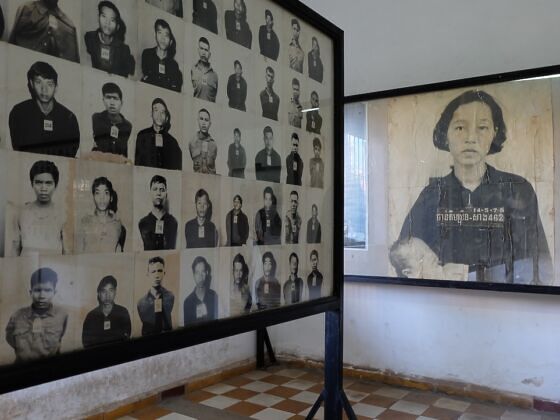When I sat down with Khmer Rouge survivor Rithy Panh, he told me a story of an Italian-Jew named Primo Levi, who only sold a few hundred copies of his first book Survival in Auschwitz, published in 1947. Levi would go on to be an accomplished author, but Panh said his road to success was rocky because it’s not a natural thing for us to tell stories of such tragedy.

Khmer Rouge Survivor and Award-Winning Director on the Power of Film
“He said he was afraid because of people who would not believe him,” Panh said. “I do not blame people who do not speak, talk, because I know it’s hard. You need time to understand why you want to tell the story and how to do it.”
Panh was born in Phnom Penh, Cambodia, in 1964, where he lost nearly his entire family to starvation and forced labor at the hands of the Khmer Rouge before escaping to Thailand and later fleeing to France. Today, he is an internationally acclaimed director, honored as Asian Filmmaker of the Year in October at the Busan International Film Festival.
Like Levi, it took Panh a significant amount of time to find his voice and understand how to tell his story. “After the genocide I liked to work with wood,” Panh said. “You can touch it, it is silent, maybe I could forget things.”
It was under the advisement of a teacher that Panh returned to school in Paris, where a friend gave him a small camera and he came upon the world of cinema entirely on accident. Panh has since returned to Cambodia, and more than 30 years after first holding that camera, now tells the unsettling stories of his country’s history. His latest film, The Missing Picture, won the Un Certain Regard Prize at the 2013 Cannes International Film Festival.
“You have to transmit the message from the people who died, the 1.8 million stories, lives, and loves lost,” he said. “I need to put a name on the face, it’s a way for me to give back justice to the people who died, give them back their dignity. If you don’t the next generation will not understand why they died, so it’s our job to tell the truth.”
But it’s not just recording the history through film and art that’s important — it’s preserving it and making it accessible to the general public. Film prints will only last 150 years in good conditions, which is not the case in many countries like Cambodia. More wealthy countries have access to digital prints and film restoration, but the history of places like Cambodia is in danger of physically disappearing.
Panh’s the driving force behind his country’s Bophana Audiovisual Resource Center, an organization whose mission is to “save and animate the memory of yesterday and today.” Opened in 2005, Bophana has worked to preserve pictures, movies, and songs from the last 150 years of Cambodia’s history. The center has also worked to salvage what’s survived the Khmer Rouge — from old films to newsreels, radio transmissions, and photos. Panh echoed how important it is to preserve the heritage of his country and create access to memory, saying that it’s hard to move forward as a country or build an identity if you don’t have access to your culture or history.
“You cannot turn over an empty page,” he said.
The Bophana Center is working outside of Cambodia as well, collaborating with countries in Africa, including Cameroon, according to Panh.
Panh’s recognition as Asian Filmmaker of the Year helps extend industry awareness to his projects like Bophana, but also plays an important part in developing the film industry itself in his country. Panh said that when the big festivals award filmmakers from smaller, less democratic nations like Cambodia, it’s like they’re offering diplomatic protection — saying that this work is important, do not interfere.
Panh says he likes to talk about Jafar Panari whenever he can. Panari is an Iranian film director who now lives under house arrest after years of conflict with the government over the content of his films, which often offer a humanistic perspective on life in Iran including hardships for children, the impoverished, and women. He has been charged with propaganda against the Iranian government and has been banned from filmmaking for 20 years and faces imprisonment. With art and film as such important conduits to preserving culture, Panh believes this sort of censorship endangers heritage.
Panari continues to produce in spite of his issues with the government, however. In 2011, his documentary feature This Is Not a Film was smuggled out of Iran in a flash-drive hidden inside a cake and shown at the 2011 Cannes Film Festival.
“We work against sometimes unfriendly conditions,” Panh said, “but it’s all to create memory.”